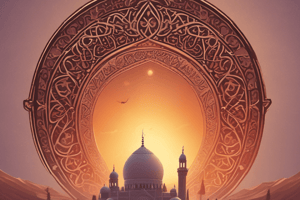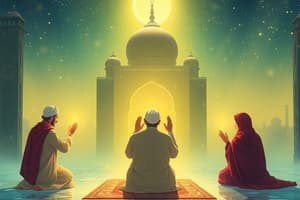Podcast
Questions and Answers
What role did Prophet Idris have in his profession?
What role did Prophet Idris have in his profession?
- Tailor (correct)
- Merchant
- Carpenter
- Shepherd
What was one of the key aspects of Prophet Idris's life besides his profession?
What was one of the key aspects of Prophet Idris's life besides his profession?
- He was a military leader.
- He was known for his wealth.
- He focused solely on his trade.
- He worshiped Allah. (correct)
Which statement best encapsulates the legacy of Prophet Idris?
Which statement best encapsulates the legacy of Prophet Idris?
- He was primarily known for his military conquests.
- He was famous for his architectural achievements.
- He dedicated his life to lawful work and worship. (correct)
- He acquired immense riches through trade.
What was Prophet Idris also known for in addition to his profession?
What was Prophet Idris also known for in addition to his profession?
How is Prophet Idris's profession viewed in a moral context?
How is Prophet Idris's profession viewed in a moral context?
What was the primary instruction given to Adam and Eve regarding their life in Paradise?
What was the primary instruction given to Adam and Eve regarding their life in Paradise?
Which being defied Allah's order to prostrate to Adam?
Which being defied Allah's order to prostrate to Adam?
What was the consequence of Adam and Eve eating from the forbidden tree?
What was the consequence of Adam and Eve eating from the forbidden tree?
What role was Adam assigned after being sent to Earth?
What role was Adam assigned after being sent to Earth?
What did Prophet Sheth (Seth) attempt to do during his lifetime?
What did Prophet Sheth (Seth) attempt to do during his lifetime?
Flashcards are hidden until you start studying
Study Notes
Tahārah (Ritual Purification)
- Tahārah refers to the purification from two types of impurities: Hadath (ritual impurity) and Khabath (material impurity).
- Purification from Khabath involves removing physical impurities from the body, clothing, or prayer space.
- Purification from Hadath requires performing ablution (Wudu) or Ghusl (ritual bath) using pure water.
- If water is unavailable or difficult to use, Tayammum (dry ablution) can be performed.
Najāsah (Material Impurity)
- To purify items affected by Najāsah, wash them thoroughly with water until clean.
- Items licked by a dog require special attention: wash them seven times, with the first wash using dust.
Merit of Ablution
- Ablution is a significant practice; it allows for the forgiveness of sins.
- According to a saying of the Prophet Muhammad, each action of ablution—washing the face, hands, and feet—cleanses sins committed by those body parts.
- The purification process ensures the individual becomes free from all sins by the completion of ablution.
Performing Ablution
- Ablution consists of specific steps, starting with washing the hands three times.
- Careful and systematic performance of ablution is essential for fulfilling ritual requirements.
Adam (Peace Be Upon Him)
- Created by Allah from clay; taught the names of all things.
- Angels commanded to prostrate to Adam; Iblis (Satan) refused.
- Adam and Eve lived in Paradise but were forbidden to eat from a specific tree.
- Tempted by Iblis, they disobeyed and ate from the tree.
- They repented, Allah forgave them but sent them to Earth as a consequence.
- Adam became the first human and Allah's representative on Earth.
Prophet Sheth (Seth)
- Called his people to belief until his death, but no one responded.
- Left his son, Prophet Idris, as a successor.
Prophet Idris (Enoch)
- Worked as a tailor, recognized for his lawful profession and worship.
- Spread Allah's message.
- His people faced punishment lasting seven nights and eight days as a lesson.
Prophet Saleh
- The people of Thamud asked for a miracle; Allah sent a she-camel.
- They disobeyed by slaughtering the she-camel.
- The poor and weak were the only followers of Prophet Saleh, regarded as the best.
Prophet Abraham
- Sought Allah; confronted his people over their beliefs.
- Thrown into a fire by his people, which Allah made cool.
- Built the Kaaba as a holy site.
- Tested by the command to sacrifice his son Ishmael and left his family in the desert.
Prophet Lot
- His daughters believed, but Noah's son disbelieved.
- People of Lot committed immoral acts; punished when their city was turned upside down.
Prophet Shu’ayb
- Served the people of Midian who faced intense heat leading to water evaporation.
- Animals and plants perished; upon seeking water, faced an unexpected fire rain instead.
Studying That Suits You
Use AI to generate personalized quizzes and flashcards to suit your learning preferences.





